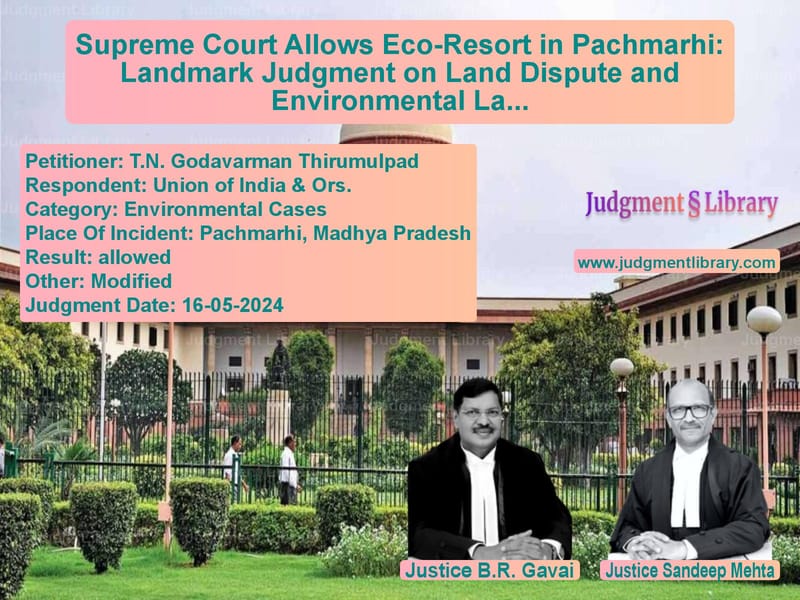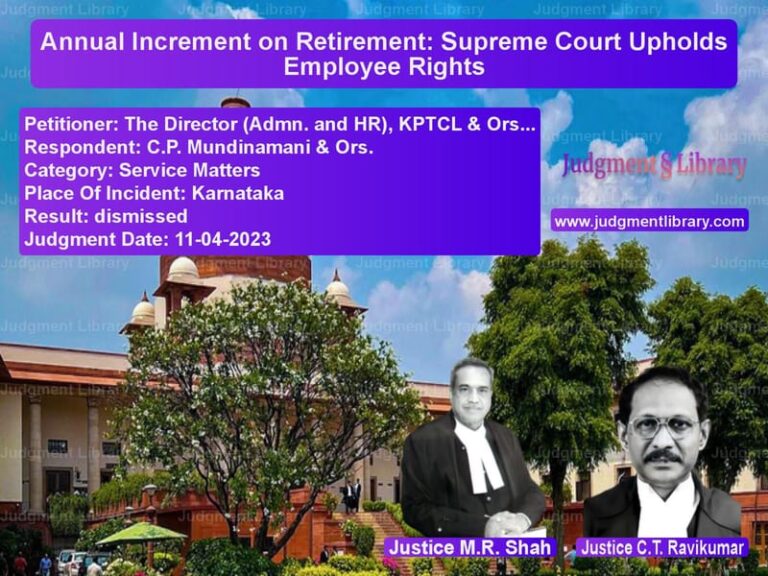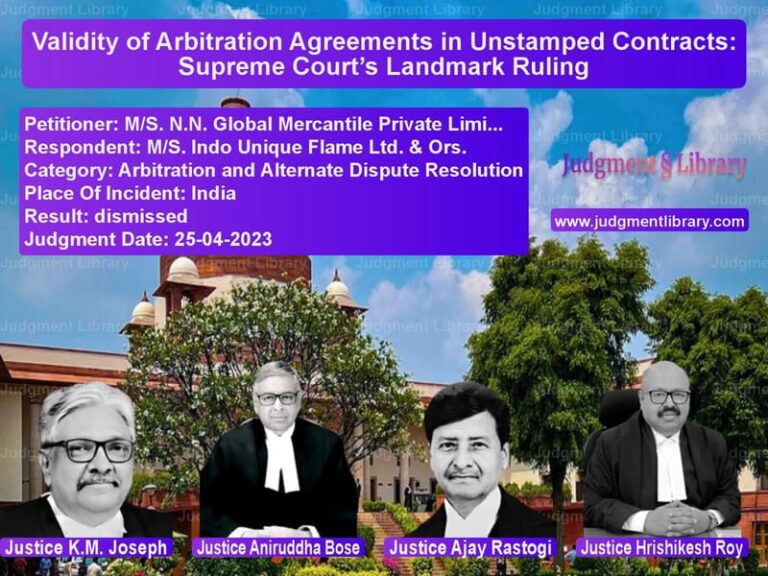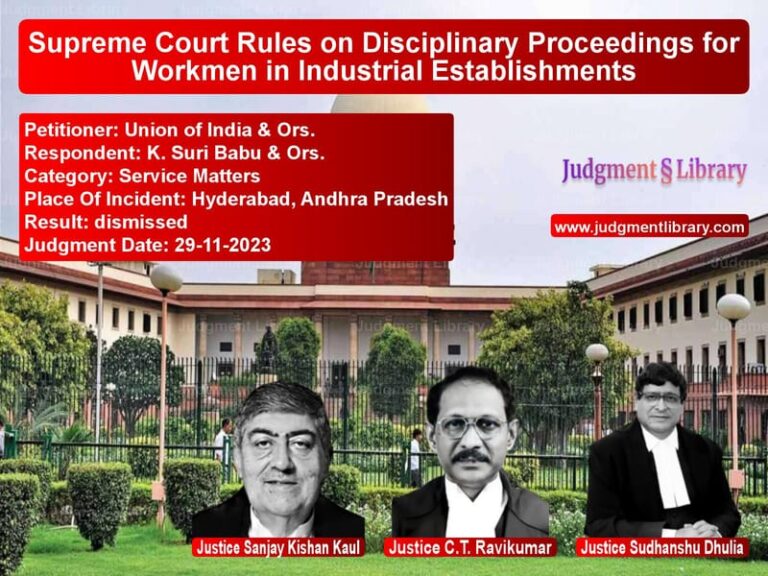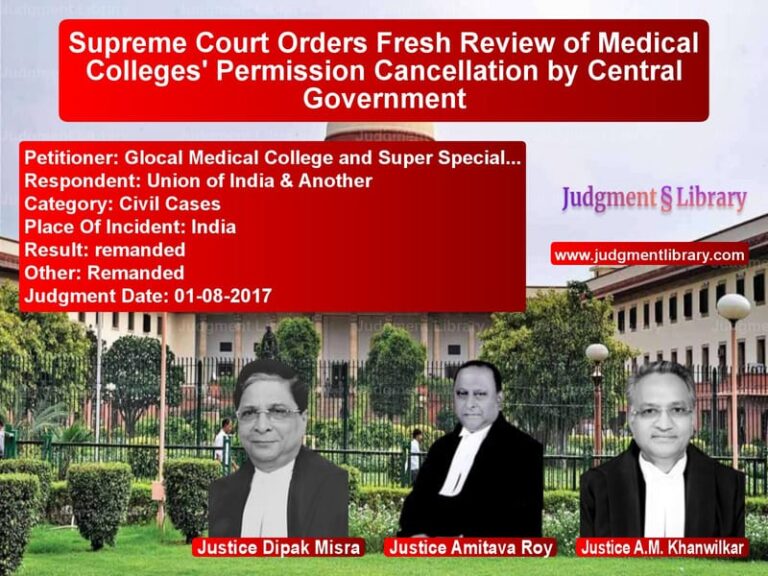Supreme Court Allows Eco-Resort in Pachmarhi: Landmark Judgment on Land Dispute and Environmental Law
The case of T.N. Godavarman Thirumulpad vs. Union of India & Ors. is a landmark judgment concerning the intersection of private land ownership and environmental protection laws. The dispute revolved around a proposed eco-resort in the Pachmarhi Wildlife Sanctuary, Madhya Pradesh, which the petitioner, M/s Shewalkar Developers Ltd., sought to construct. The state government and the Central Empowered Committee (CEC) opposed the construction, claiming the land fell within an Eco-Sensitive Zone (ESZ). The Supreme Court ruled in favor of the petitioner but imposed conditions to ensure compliance with environmental regulations.
Background of the Case
The dispute dates back to the early 1990s when M/s Shewalkar Developers Ltd. legally purchased two plots (14/3 and 14/4) in Pachmarhi, Madhya Pradesh. The land was initially considered outside the protected area, but subsequent developments led to conflicting claims regarding its status.
Chronology of Events
- 1977: The Government of Madhya Pradesh declared Pachmarhi a wildlife sanctuary under the Wild Life (Protection) Act, 1972. However, it did not clearly demarcate the boundaries.
- 1991: The petitioner purchased the land from a private owner with approval from the state government.
- 2000: The Collector of Hoshangabad issued an order excluding the civil/nazul area of Pachmarhi from the sanctuary.
- 2004: Legal disputes arose over similar land transactions, casting doubt on the ownership rights.
- 2013: The Supreme Court accepted the state’s recommendation to exclude 395.939 hectares, including the petitioner’s land, from the sanctuary.
- 2017: The Ministry of Environment declared Pachmarhi an Eco-Sensitive Zone (ESZ), restricting new construction.
- 2020: The Central Empowered Committee (CEC) opposed the eco-resort proposal, citing environmental concerns.
Legal Proceedings
Arguments by the Petitioner (M/s Shewalkar Developers Ltd.)
The petitioner argued:
- The land was legally acquired and excluded from the wildlife sanctuary in 2013.
- The eco-resort would promote sustainable tourism and boost the local economy.
- Other commercial developments, including state-run resorts, were already operational in the area.
- The CEC’s objections were based on incorrect assumptions regarding the land’s classification.
Arguments by the Respondents (State of Madhya Pradesh & CEC)
The respondents countered that:
- The land fell within an Eco-Sensitive Zone and required special permissions for construction.
- New construction was restricted under the 2017 ESZ notification.
- Pending litigation over similar land transactions created legal uncertainty.
Supreme Court’s Judgment
The Supreme Court ruled in favor of the petitioner but with strict conditions. The Court held:
“The applicant’s proprietary rights under Article 300A of the Constitution cannot be infringed merely due to pending litigation over related land.”
The Court directed:
- The CEC and local authorities must objectively assess the construction proposal.
- The project must comply with the 2017 Eco-Sensitive Zone notification.
- A decision must be made within two months to ensure adherence to environmental laws.
Analysis of the Judgment
The Supreme Court’s judgment strikes a balance between property rights and environmental conservation. The ruling confirms that legally acquired land cannot be arbitrarily restricted without due process. However, the Court also emphasized the importance of ensuring that developments in eco-sensitive areas comply with environmental regulations.
Implications of the Judgment
- Property Rights: The Court reaffirmed that private ownership must be respected and cannot be overruled without due legal process.
- Environmental Compliance: The judgment ensures that developments in sensitive areas adhere to conservation laws.
- Judicial Oversight: The Supreme Court acted as a mediator, balancing landowner rights and environmental concerns.
Conclusion
The Supreme Court’s decision in T.N. Godavarman Thirumulpad vs. Union of India & Ors. underscores the complex interplay between land rights and environmental protection. While allowing the eco-resort project to proceed, the Court imposed conditions to safeguard ecological interests. This ruling sets a precedent for future cases involving land use in eco-sensitive zones.
Petitioner Name: T.N. Godavarman Thirumulpad.Respondent Name: Union of India & Ors..Judgment By: Justice B.R. Gavai, Justice Sandeep Mehta.Place Of Incident: Pachmarhi, Madhya Pradesh.Judgment Date: 16-05-2024.
Don’t miss out on the full details! Download the complete judgment in PDF format below and gain valuable insights instantly!
Download Judgment: t.n.-godavarman-thir-vs-union-of-india-&-ors-supreme-court-of-india-judgment-dated-16-05-2024.pdf
Directly Download Judgment: Directly download this Judgment
See all petitions in Property Disputes
See all petitions in Environmental Cases
See all petitions in Judgment by B R Gavai
See all petitions in Judgment by Sandeep Mehta
See all petitions in allowed
See all petitions in Modified
See all petitions in supreme court of India judgments May 2024
See all petitions in 2024 judgments
See all posts in Environmental Cases Category
See all allowed petitions in Environmental Cases Category
See all Dismissed petitions in Environmental Cases Category
See all partially allowed petitions in Environmental Cases Category

